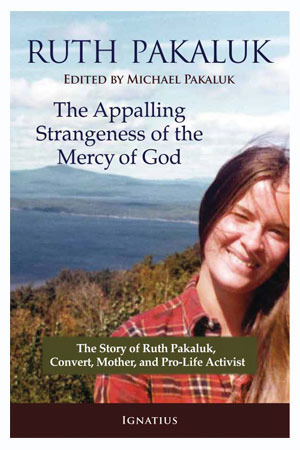"Ruth's story is likewise one of holiness, extraordinary virtue..."
Dwight G. Duncan, professor at UMass School of Law Dartmouth, writes in the The Boston Pilot newspaper about the life and witness of Ruth Pakaluk:
Ruth Pakaluk died of metastatic breast cancer in 1998 at the youthful age of 41. She had seven children (one of whom  died of sudden infant death syndrome), and was married to Michael Pakaluk, professor of philosophy at Ave Maria University (and columnist for The Boston Pilot). Ignatius Press has just published a magnificent volume of her letters and talks entitled "The Appalling Strangeness of the Mercy of God," edited with a biographical overview and notes by Michael.
died of sudden infant death syndrome), and was married to Michael Pakaluk, professor of philosophy at Ave Maria University (and columnist for The Boston Pilot). Ignatius Press has just published a magnificent volume of her letters and talks entitled "The Appalling Strangeness of the Mercy of God," edited with a biographical overview and notes by Michael.
One might think that her life, marked by the untimely deaths of her son Thomas, followed by her own, was tragic. Actually, it is more a divine comedy that has a happy ending, manifesting "the appalling strangeness of the mercy of God," one of her favorite lines from a Graham Greene novel.
This is because, as Michael documents in his introduction, Ruth's life was one of continual conversion and joy amidst the ups and downs of daily life. She showed "the greatest love in the smallest things," as Pope Benedict recently said of St. Therese of the Child Jesus. Gifted with a great sense of humor, a powerful and penetrating intellect, and a dynamite writing style, Ruth reminds me of Flannery O'Connor, the great American writer whom Thomas Merton compared to Sophocles.
Okay, I'm biased. I knew Ruth the last ten years of her life, and have always been close to Michael and the Pakaluks. Ruth, Michael and I were all active in Opus Dei as well as the pro-life movement, and we all had Harvard bachelor's degrees. Funny to think of Ruth (or Michael, for that matter) as a bachelor of anything, since they got married as undergrads. Ruth went on to serve as president of Massachusetts Citizens for Life for a number of years, as if being a mother and homemaker didn't give her enough to do. ...
The pope could easily have been explaining Ruth when he said earlier this week: "Christian holiness is none other than charity, fully experienced." However, in order that charity might, "like a good seed, grow in the soul and there bear fruit, the faithful must listen gladly to the Word of God and, by its grace, carry out His will through their works, participate frequently in the sacraments, above all the Eucharist and the Holy Liturgy; they must constantly apply themselves in prayer, in the abnegation of their selves, in the active service of their brothers and in the exercise of every virtue" (Pope Benedict XVI, general audience of April 13, 2011).
Get this book. Read this book. It couldn't be more timely: A Hollywood movie out next month entitled "There Be Dragons" depicts the origins of Opus Dei in the early years of St. Josemaria Escriva, its founder. Ruth's story is likewise one of holiness, extraordinary virtue, lived amidst ordinary concerns in modern America. Her story, though practically here and now, is nonetheless timeless and radiant.
Read the entire column. On Ignatius Insight, you can read Peter Kreeft's Introduction to The Appalling Strangeness of the Mercy of God: The Story of Ruth Pakaluk: Covert, Mother, Pro-life Activist, edited by Michael Pakaluk:

Carl E. Olson's Blog
- Carl E. Olson's profile
- 20 followers



